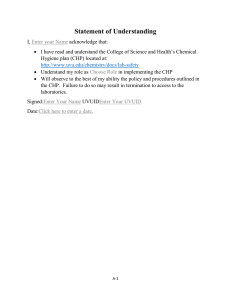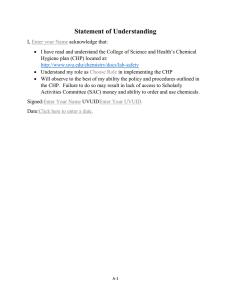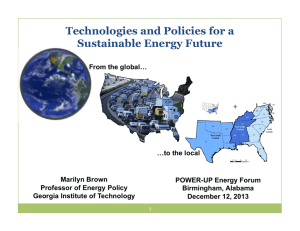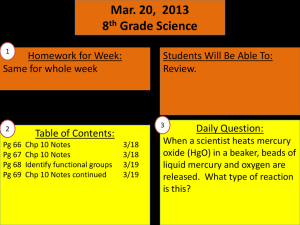Achieving Significant Carbon Emissions Reductions through
advertisement
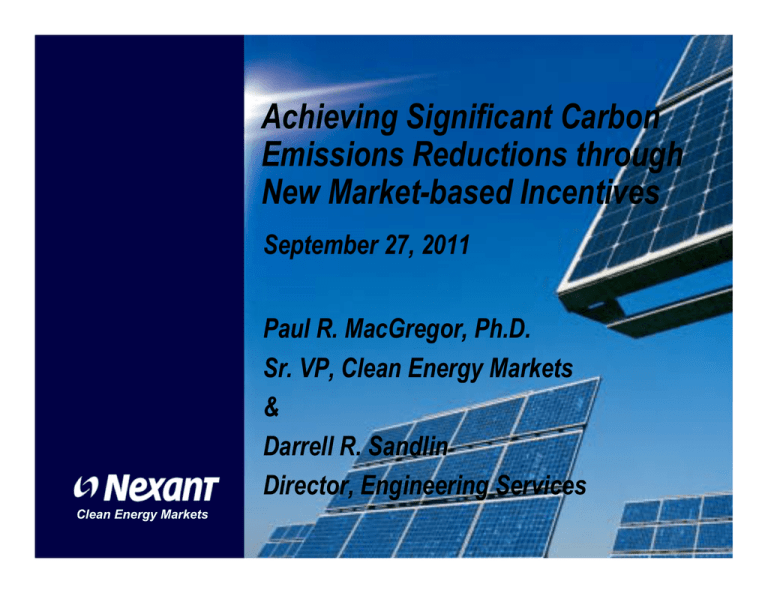
Achieving Significant Carbon Emissions Reductions through New Market-based Incentives September 27, 2011 Paul R. MacGregor, Ph.D. Sr. VP, Clean Energy Markets & Darrell R. Sandlin Director, Engineering Services Clean Energy Markets Renewable Portfolio Standards 29 States & DC have an RPS MA IL CT PA State RPS State RPS with EECs 2 Clean Energy Markets Energy Efficiency Certificates (EECs) Tradable Credits to Incentivize Investment Retail Electricity Suppliers Must Purchase Represents the Energy (Electricity) Saved Technologies – Operational Changes – Technology Replacements – Waste Heat Recovery EEC – Cogeneration / Combined Heat & Power 3 Clean Energy Markets Energy Efficiency Certificates (EECs) Promotes Efficient, Firm, Distributed, Clean Power Short-term Cost - Rate Increase < 1% Long-term Savings – Avoided Costs – New Generation Plants – New Transmission Lines – Increases Reliability Existing Grid Leverages Private Capital Stimulates Local Job Growth Reduction in Emissions (CO2, SO2, NOx) 4 Clean Energy Markets State Programs Pennsylvania – Combined Efficiency Tier – 1 MWh generation = 1 EEC – ACP = $45 – DG, DSM, Large Hydro, MSW, Wood Waste, IGCC & Waste Coal – Formal M&V application + Revenue metering – Requirements 4.2% in 2007, 6.2% in 2011 and 8.2% in 2016 – Only 1 qualified CHP as DG in PA RPS (Nexant) – EEC prices ~ pennies ($/MWh) 5 Clean Energy Markets State Programs Illinois – Incorporated Efficiency In Existing Single Tier – Waste Heat & CHP eligible – Minimums Requirements for Wind & Solar – Allows Out-of-State Projects to Participate – Lowest Total Cost > Budget-based “ACP” – Requirements 2% in 2009, increasing to 25% per year in 2026 – Only 1 qualified CHP (Waste Heat) in Illinois (Nexant) – EEC prices < a dollar ($/MWh) 6 Clean Energy Markets State Programs Connecticut – Separate Efficiency Tier ~ Class III REC – ACP = $31/EEC (1 MWh = EEC) – CHP and Conservation projects eligible – Requirements 1% in 2007 ~ 4% in 2010 & beyond – Formal M&V application process + Revenue Metering – Early Adopters awarded DG Grants $450 ~ $500/kW – Over 800% increase in efficiency 60+ new CHP plants – Credit surplus by 2009 – EEC prices ~ $10 ($/MWh) 7 Clean Energy Markets Connecticut CO2 Reductions from EEC Program Over 1.3 million mTons or about ¼ million Cars (10 yrs) mTons Annual CO2 Emissions Reductions 8 Clean Energy Markets State Programs Massachusetts – “Green Communities Act” – Emissions driven – Separate Efficiency Tier ~ APS – CHP and Flywheel Storage (+) – ACP = $20 (CPI Inflation) – EEC formula promotes higher efficiency projects – Requirements ½% in 2009, increasing ½% per year – Installation Grants up to $750/kW from Utilities – Over two dozen new CHP plants in first 2 years – EEC prices ~ high teens ($/MWh) 9 Clean Energy Markets Massachusetts CO2 Reductions from EEC Program Over 2.2 million mTons or about 400,000 Cars (10 yrs) mTons Annual CO2 Emissions Reductions 10 Clean Energy Markets Energy Efficiency Project Examples 11 Clean Energy Markets Chiller Replacement – Groton CT 4 Centrifugal Chillers generating 3,800 RT @ 0.8 kW/t Replaced with 4 Centrifugal Chillers generating 4,200 RT @ 0.6 kW/t 1,734 MWhr Electric Savings Annually – 651 MT CO2 – 2 MT SO2 – 1 MT NOx. CT Class III RECs x $10 ea. = $17,340 12 Clean Energy Markets Chiller Replacement – Emissions Impact 13 Clean Energy Markets Data Center Improvement – Atlanta, GA 175,000 ft² site - Tier IV Facility ECMs include Equipment & Operations – – – – – – – New Energy Mgt System 1000 ton hour TES 2000 ton hour Waterside Economizer Sealing under floor air leaks (CRAH) Increased chilled water temperature Summer & Winter Eliminate electric humidifiers (dew point improvement) Reduced number of CRAH units to cool the space Annual Savings of 4,095 MWhr Voluntary EEC’s (Georgia) $0.75/MWh = $3,071 14 Clean Energy Markets Data Center Improvement – Emissions Impact 15 Clean Energy Markets New CHP – Boston, MA Opportunity – 7 MW Electric Load – 61,000 MWh annually – 25 MMBTU Steam Load – 225,000 MMBTU annually – 24 x 7 manufacturing operations – Purchased Electricity @ $120 / MWh – #2 Oil fired Boilers – Lower total energy costs and reduce GHG + Air Pollution Recommendation – Energy Efficiency Improvement – Incorporate CHP – Gas fired Turbine + HRSG – “GTCHP” – Establish Firm Natural Gas Supply Contract – Include Revenue Quality Metering (Fuel, Electric, BTU) – Register under Massachusetts APS Program 16 Clean Energy Markets New CHP – Diagram 17 Clean Energy Markets New CHP – System Solution – 5 MW Gas fired Turbine + OTSG – 31% Electric Efficiency (HHV) - 11 MMBTU/MWh – 70% Thermal Efficiency – WO Duct Firing – 79% Overall Fuel Efficiency – Fuel Charged to Power (FCP) – 4.6 MMBTU/MWh – Heat to Power Ratio – 1.6 : 1 – Annual operating hours – 8,300 (95%) – 41,500 MWhe (70% of existing load) – 64,660 MWhth (100% of existing load) – Cost to Generate + O&M - $59 / MWh - $2.53 million/ yr – Generate 72,700 AECs - $1.45 million/yr – 2.5 yr payback 18 Clean Energy Markets New CHP - Economics Utility Electricity Purchase = 12 ¢/kWh CHP Generation Cost = 5.9 ¢/kWh (3.9¢ fuel + 2¢ O&M) EECs ~ 2 ¢/kWh 19 Clean Energy Markets New CHP – Emissions Impact 20 Clean Energy Markets United States CO2 Source Emissions 66% of US GHG emissions comes from heat & power production – Data from US EIA & US DOT 21 Clean Energy Markets Summary Efficiency gains in chilled water systems will reduce GHG emissions and air pollution. Are typically capital intensive. EECs can improve ROI 20 ~ 35% Data Centers are energy intense facilities. Operational changes within supporting infrastructure can yield significant electric and emissions savings without major capital costs. EECs could provide 25% increase in ROI & encourage more work. The overall fuel efficiency gains from combined heat and power (CHP) can provide substantial GHG emissions & air pollution reductions when fired from clean natural gas. While CHP is capital intensive, when properly sized to the load profile, paybacks in 2 ~ 4 years are typical. EECs leverage private capital by improving ROI 20 ~ 35%. 22 Clean Energy Markets Conclusion EEC Programs Create Significant CO2 Savings Paul R. MacGregor, Ph.D. pmacgregor@nexant.com Darrell R. Sandlin dsandlin@nexant.com Nexant Clean Energy Markets 1805 Old Alabama Rd, Suite 315 Roswell, GA 30076 23 Clean Energy Markets
